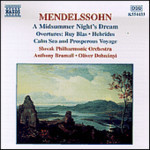
A Midsummer Night's Dream / Overtures
 $25.00
Out of Stock
$25.00
Out of Stock6+ weeks add to cart
MENDELSSOHN
A Midsummer Night's Dream / Overtures
Slovak Philharmonic Orchestra / Anthony Bramall
[ Naxos / CD ]
Release Date: Sunday 4 March 2007
This item is currently out of stock. It may take 6 or more weeks to obtain from when you place your order as this is a specialist product.
Felix Mendelssohn was born in Hamburg, son of the banker Abraham Mendelssohn and grandson of the great Jewish thinker Moses Mendelssohn, the model for Lessing's Nathan the Wise, the epitome of tolerance in a generally intolerant world.
In 1812 the family moved to Berlin after the French occupation of Hamburg and it was there that Mendelssohn received his education, in music as a pupil of Carl Zelter, for whom the boy seemed a second Mozart. As a child he was charming and precocious, profiting from the wide cultural interests of his parents and relations, excelling as a pianist and busy with composition after composition. In 1816 he was baptized a Christian, a step that his father took six years later, accepting what Heine described as a ticket of admission into European culture although it was one not always regarded as valid by prejudiced contemporaries.
Abraham Mendelssohn sought the best advice when it came to his son's choice of career. Cherubini, director of the Paris Conservatoire, was consulted, and, while complimenting Abraham Mendelssohn on his wealth, agreed that his son should become a professional musician, advice given during the course of a visit to Paris in 1825 when Mendelssohn met many of the most distinguished composers and performers of the day. In Berlin his career took shape, with prolific composition and activity as a pianist and as a conductor. His education was to include a period of travel throughout Europe, a Grand Tour that took him as far north as Scotland and as far south as Naples, his journeys serving as sources of inspiration.
Mendelssohn's subsequent career took him to Leipzig, where from 1835 he conducted the Gewandhaus Orchestra and was later to be instrumental in the establishment of a conservatory. In 1841 he became involved in attempts by the new Prussian king, Friedrich Wilhelm IV, to establish an Academy of the Arts in Berlin. Mendelssohn was invited to assume the responsibilities of director of the music section, which would function both as a conservatory and as a concert-giving organization. The immediate result of his appointment was the commission to provide incidental music for a series of plays, starting with the Antigone of Sophocles, in 1841, followed, in 1842, by Shakespeare's A Midsummer Night's Dream, performed in Potsdam with the German translation of the play by Ludwig Tieck who to the composer's dismay had divided the play into three acts, necessitating the playing of one of the entr'actes with the curtain raised. He disapproved, too, of the decision to use Spanish Baroque costumes. The audience found the music of Mendelssohn to its taste, but deplored the vulgarity of Shakespeare.
Shakespeare's play A Midsummer Night's Dream was an early favourite of the Mendelssohn family and in 1826 Felix Mendelssohn had written an Overture, a musical summary of the play, inspired by the German translation of August Wilhelm Schlegel, brother-in-law of Mendelssohn's Aunt Dorothea, and by the beauty of a summer evening in the garden of the family house in Berlin. The incidental music to the later production of the play starts with this Overture. The Scherzo, a first entr'acte, depicts the gossamer elegance and the humour of what follows in the dispute between Oberon and his wife, the Fairy Queen, Titania. The Intermezzo is more human in its references to the lovers, taking refuge in the forest from parental disapproval, only to suffer the misunderstandings brought about by the well-intentioned interference of the fairies in their mortal world. The entr' acte ends with music for the rude mechanicals, the Athenian workmen who rehearse their solemn tragedy of Pyramus and Thisbe in the forest, in preparation for performance at the wedding of Duke Theseus. The Notturno shows night in the forest, as the lovers sleep and Puck applies a magic potion to their eyes, so that when they wake all will be well and "every Jack shall have his Jill", and Titania, in the scene that follows, lavishes her bewitched affection on Bottom the Weaver, translated by Puck's spell into a donkey. The Wedding March celebrates the marriage of Duke Theseus to Hippolyta, Queen of the Amazons, a match that provides a formal mortal framework for the enchantment at the heart of the play.
Among the concert overtures written by Mendelssohn the best known remain Meeresstille und glückliche Fahrt ('Calm Sea and Prosperous Voyage'), Ruy Blas and Die Hebriden ('The Hebrides') or Fingalshöhle ('Fingal's Cave'), the second title of the last of these suggesting the romantic influence of the poems attributed to Ossian. Calm Sea and Prosperous Voyage was written in 1828 and first performed in Berlin in the same year. The work is based on two poems by Goethe, whom Mendelssohn had visited in Weimar in 1821. The first of the two. Tiefe Stille herrscht im Wasser (Deep calm over the water), gives a picture of absolute stillness, as the ship, like the ancient mariner's, is becalmed and all is Todestille furchterlich (the terrible stillness of death). Movement comes with the second poem, Die Nebel zerreissen (The mists part), as the winds blow and the ship sails again to land now in sight.
Tracks:
Incidental Music to Shakespeare's "A Midsummer Night's Dream":
Overture, Op. 21
Scherzo, Op. 61, No. 1
Intermezzo, Op. 61, No. 2
Notturno, Op. 61, No. 3
Wedding March, Op. 61, No. 4
Calm Sea and Prosperous Voyage, Overture, Op. 27; Ruy Bias, Overture, Op. 95
Fingal's Cave, Overture, Op. 26



